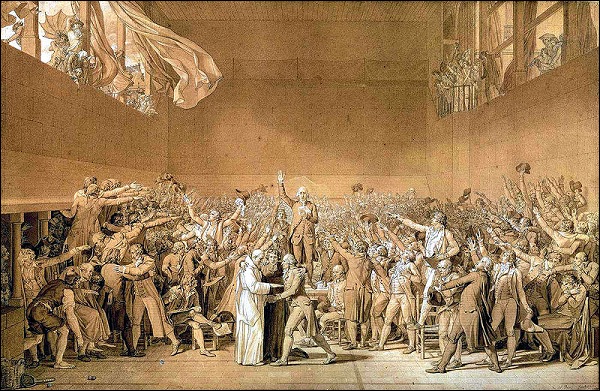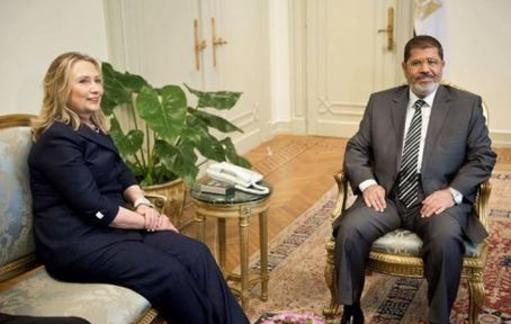[ by Charles Cameron — on various instances of citizens “taking the law into their own hands” in attempts to arrest the Queen, two Popes, Harper of Canada and Tony Blair ]
.
I am not really up on the sovereign citizen movement here in the US, perhaps because it is not overly religious — we’ll talk about that in part II. What interests me in this first part is the sense that the sovereignty of nations is being questioned by citizens.

**
It sees to me that what we’re witnessing in these two “leading indicators” is an unraveling of trust in the state itself.
My first instance comes from the Arrest Blair movement, which is basically a blog site with a bank account…
This site offers a reward to people attempting a peaceful citizen’s arrest of the former British prime minister, Tony Blair, for crimes against peace. Anyone attempting an arrest which meets the rules laid down here will be entitled to one quarter of the money collected at the time of his or her application.
Money donated to this site will be used for no other purpose than to pay bounties for attempts to arrest Tony Blair. All the costs of administering this site will be paid by the site’s founder.
The site is not without supporters, and there are at least a few people willing to attempt the arrest. The site’s Attempts made so far page records four payments thus far totaling £10,971.56, or roughly $16,700 US. Notably, it appears that at least three out of the four claimants have paid all or a major part of the funds they received to charities.
I would note as an aside that the suggestion that Tony Blair should be tried for war crimes has a number of supporters who are not AFAIK connected in any way with the “citizen arrest” attempts described here.
**
My second instance is that of the International Tribunal into Crimes of Church and State, which appears to be largely the brainchild of one Rev Kevin D Annett MA, MDiv, a one-time minister of the United Church of Canada.
I’d suggest that anyone who takes Kevin Annett at all seriously should consider that he purports to be involved with an international legal entity with competence to try the Pope — and yet gives his signature to paragraphs like these:
When the Bloody Emperor stands naked, only our illusions keeps him protected and immune from the final accounting that is coming.
The tornado that followed my first exorcism outside the Vatican in 2009, and the lightning that struck it on the day of Benedict’s resignation, were not accidental. Joe Ratzinger should know from the history of his own former SS buddies that criminal institutions can run, but they can’t hide – even behind all the wealth and pomp in the world.
Prepare for Easter! Flush the Rat from the Vat!
With such strident rhetoric and with exorcism a feature of his own activities, it’s hard to take him altogether seriously.
The court’s view of its own status, independent of other jurisdictions, is expressed thus:
It is understood by our Court that its decisions, based as they are on Natural and Common Law, supersede and invalidate all statutes and statutory laws which conflict with the decisions of the Court, particularly when those statues uphold crimes or their concealment, or the protection of the guilty. Similarly, our Court does not recognize the jurisdiction or authority of any contending legal systems, such as the so-called “Canon Law”, or any form of personal, diplomatic or legal immunity governing any person or institution, including heads of states, churches and corporations.
Here, FWIW, is the opening of a recent posting on their site of a Public Banning Order to be issued by the Common Law Court of Justice against Pope, Cardinals, and Archbishop Wilfrid Napier for aiding and encouraging child rape in the case of some First Nations children:
After evading arrest by lawful Common Law Court officers, over thirty officials of church and state now face permanent banishment from their communities during Easter Week for being wanted criminals who are a danger to children everywhere.
These officers include Pope Francis I and former Pope Joseph Ratzinger, Canadian Prime Minister Stephen Harper and Queen Elizabeth Windsor of England, all of whom were ordered detained by Citizen Arrest Warrants issued by the International Common Law Court of Justice on March 5 and 15, 2013.
“They have defied the law and lawful arrest, so therefore they are declared to be public enemies who are no longer welcome or allowed in our communities” explained Rev. Kevin Annett, who presented the evidence to the Court that convicted the guilty.
Here I would note for the record that I am entirely uninformed and take no sides in those issues which form the basis of Annett’s acute disgust with various churches, churchmen and politicians.
**
By way of context, but without suggesting any direct connection between the two instances above and the widely-documented Sovereign Citizens, here’s a brief overview of that movement.
From a WECT special report:
Hundreds of thousands of sovereign citizens currently live throughout the United States.
The FBI calls them “domestic terrorists.” They’re also known as extremists, radicals and defenders of freedom.
According to experts, sovereign citizens are Americans who think the laws don’t apply to them.
Most of them have their own constitution, bill of rights and government officials.
Sovereign citizens can be dangerous and violent. There have been a number of cases where sovereigns took matters into their own hands by killing members of law enforcement.
From the Montgomery Advertiser, today:
Self-proclaimed president of sovereign citizen nation convicted
After a five-day trail, a federal jury in Montgomery has convicted Tim Turner, the self-proclaimed president of the Sovereign Citizen Nation, on a variety of charges relating to defrauding the government.
The jury convicted the 57-year-old Skipperville resident on conspiracy to defraud the U.S. government, attempting to pay taxes with fictitious financial instruments, attempting to obstruct and impede the Internal Revenue Service, failing to file a 2009 federal income tax return and falsely testifying under oath in a bankruptcy proceeding, according to the U.S. Attorney’s office.
The FBI began an investigation after Turner and three other individuals sent demands to all 50 governors in the United States ordering each governor to resign within three days or be “removed,” according to a news release from Sandra J. Stewart, acting U.S. attorney for the Middle District of Alabama.
The investigation found that Turner was the self-proclaimed president of the so-called sovereign citizen group “Republic for the united States of America (RuSA).” As president, Turner traveled the country in 2008 and 2009 teaching others how to defraud the IRS by preparing and submitting fictitious “bonds” to the U.S. government in payment of federal taxes.
An estimate of the group’s size was posted in the SPLC’s Intelligence Report a few years back:
Not all tax protesters are sovereign citizens, and many newer recruits to the sovereign life did not start out as tax protesters. But based on the available evidence, a reasonable estimate of hard-core sovereign believers today would be 100,000, with another 200,000 just starting out by testing sovereign techniques for resisting everything from speeding tickets to drug charges, for a total of 300,000. As sovereign theories go viral throughout the nation’s prison systems and among people who are unemployed and desperate in a punishing recession, this number is likely to grow.
**
Finally, it’s worth comparing the attempts to make citizen’s arrests of sundry heads of state, present and former, monarchic, papal and democratic, with the methods employed by the International Criminal Court at the Hague — which has a question in its FAQ:
Who has to execute the warrants of arrest?
The responsibility to enforce warrants of arrest in all cases remains with States. In establishing the ICC, the States set up a system based on two pillars. The Court itself is the judicial pillar. The operational pillar belongs to States, including the enforcement of Court’s orders.
**
As I say, I’m not “up” on the theory or history of loss of faith in government and it’s corollary, taking the law into one’s own hands” — but it presumably ties into such notions as hollow states, prerevolutionary states, and vigilantism.
I’d appreciate a little history, a little context… not just in terms of the US sovereign citizen movement, but in broad enough scope to include vigilantism, non-violence, and the current attempts to arrest the Queen, the Popes (Francis regnant and Benedict emeritus) and Tony Blair.
Your comments and insights?







